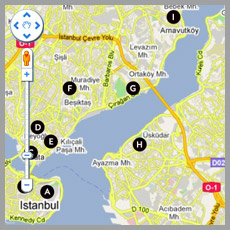![]() The first thing you see are the cigarette butts. There are thousands of them — 4,213 to be exact — mounted behind plexiglass on the ground floor of the Nobel laureate Orhan Pamuk’s new museum, named for and based on his 2008 novel, “The Museum of Innocence.”
The first thing you see are the cigarette butts. There are thousands of them — 4,213 to be exact — mounted behind plexiglass on the ground floor of the Nobel laureate Orhan Pamuk’s new museum, named for and based on his 2008 novel, “The Museum of Innocence.”
It’s a fittingly strange beginning to a tour of this quirky museum, tucked away in a 19th-century house on a quiet street in the Cukurcuma neighborhood, among junk shops that sell old brass, worn rugs and other bric-a-brac.
But it is also, like everything else on the museum’s four floors, a specific reference to the novel — each cigarette has supposedly been touched by Fusun, the object of the narrator’s obsessive love — and, by extension, an evocation of the bygone world in which the book is set.
“The Museum of Innocence” is about Istanbul’s upper class beginning in the 1970s, a time when Mr. Pamuk was growing up in the elite Nisantasi district. He describes the novel as a love story set in the melancholic back streets of that neighborhood and other parts of the European side of the city. But more broadly it is a chronicle of the efforts of haute-bourgeois Istanbulis to define themselves by Western values, a pursuit that continues today as Turkey as a whole takes a more Islamic turn. Although Mr. Pamuk said the book explores the “pretensions” of upper-class Turks, who “in spite of their pro-Western attitudes are highly conservative,” it is hard not to the see the bricks-and-mortar Museum of Innocence as largely an act of nostalgic appreciation.
Mr. Pamuk, 59, is Turkey’s best-known writer, albeit a divisive one thanks to his Western orientation. He won the Nobel Prize in Literature in 2006, around the time he was being tried and acquitted for making “un-Turkish” pronouncements about the Armenian genocide. In person he gives off an aura of the kind of elitism that can come with a privileged upbringing and a successful literary career.
Click to continue: NY Times



















